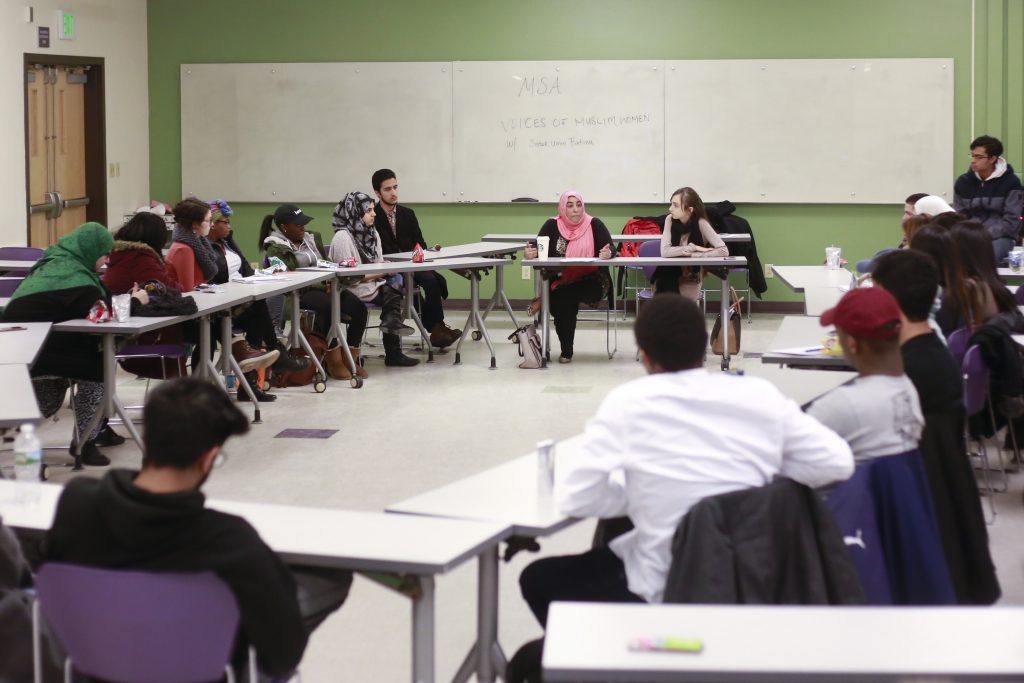
At a time when Muslims are facing rising tensions in the United States, Umm Fatima Amjad, a figure in the Binghamton Muslim community, discussed the importance of educating others about Islam.
On Friday evening, around forty students and community members gathered in Old University Union to participate in a discussion led by Amjad. The event, hosted by the Muslim Student Association (MSA), was titled “Voices of Muslim Women.” Habeeb Sheikh, the president of the MSA and a senior double-majoring in political science and cinema, said the event was created as part of Women’s History Month to share the history of women in Islam and to educate people on misunderstandings they may hold involving the relationship between the two.
“As president of the MSA and a Muslim, I often hear many stereotypes or misconceptions about how women are treated in Islam,” Sheikh said. “I am hoping that students come out of [this] meeting with those misconceptions cleared up.”
At the event, Amjad discussed her own personal journey as a Muslim, as well as stories of prominent women in Islam and how looking back at the history of her faith has empowered her.
Amjad was born in New York City to Pakistani immigrant parents. She graduated in 2000 from Purdue University with a degree in computer engineering. She was active in Purdue’s MSA and became the organization’s first female board member. Although she is not a religious leader, she is well known in the local Islamic community for giving life advice to young Muslims and helping them navigate religious problems.
“I am not a scholar,” Amjad said. “I am not [a scholar of Islam], but … I’ve learned through my friends and by attending lectures and conferences over the country. And what I can offer is just experience of the things that I’ve went through.”
During the discussion, Amjad talked about the struggles she has encountered as a first-generation immigrant. She said she often felt as though she was one person playing many roles. She separated these roles into four categories: being a good student, being a good Pakistani girl, being a good American citizen and being a good Muslim. Amjad said it was difficult to succeed in all her roles and to fulfill the many expectations placed on her, but through her faith she found guidance.
“What drives [Muslim women] and what allows us to speak out is that we have to be confident in our own skin,” Amjad said. “We need to understand who we are, where we come from, our history. Because if we don’t understand what a Muslim woman represents, then we won’t be able to clear misconceptions.”
Amjad stated that there are many misconceptions about the relationship between Islam and women, including the idea that Muslim women are all oppressed or subservient. According to Amjad, the first step to combat these misunderstandings is through education about the faith and its values. She also encouraged young people, especially women, to get involved in their local governments, student governments and communities. She said that Muslims must become part of the conversation in order to change it.
“The first step is you want to learn the history,” Amjad said. “Not only of the prophet but the women around him, or women that were in history that helped shape the religion. Once you have that history then you’re more confident in speaking out to others.”
Hira Qayyum, a junior majoring in business administration, said that a woman’s individual relationship with Islam is a topic that needs to be explored. She said too often a woman’s commitment to the religion is tied to other factors, rather than to her character.
“Obviously there’s a lot of misconceptions in Islam itself, like women are oppressed or that the hijab is forced upon women,” Qayyum said. “[There are] these different ideas that if you’re not a hijabi, then you’re not religious … these are arguments that women today think.”


